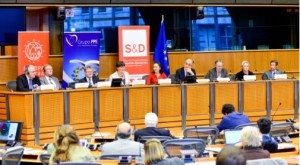
FAVEL Bruno, KOCH Uwe, SMITH Brian, QUAEDVLIEG-MIHAILOVIC Sneska, TAPARDEL, Claudia, MILLAN MON, Francisco Jose (EPP,ES), CLAUSSE Guy, PUGH Kate, ZAMPIERI Walter
Meeting of the intergroup on European tourism development, cultural heritage, Ways of St. James and other European cultural routes
© European Union 2015 – Source : EP
On 16 September in Brussels, the results of the ‘Cultural Heritage Counts for Europe’ (CHCFE) project were presented to the Members of the European Parliament in Brussels during the meeting of the Intergroup on European tourism development, cultural heritage.
Following just a week after the adoption by the European Parliament of a Resolution calling for the implementation of an integrated approach to cultural heritage for Europe (with over 80% of MEPs voting in favour), cultural heritage was at the heart of discussions of this first ever meeting of the European Parliament Intergroup on European tourism development, cultural heritage and the Way of St James and other cultural routes. This meeting gathered over 100 participants from the European Union Institutions, representatives of EU Member States and Regions, European civil society and the private sector. Co-organised by Europa Nostra, leader partner of the Cultural Hertiage Counts for Europe project, and the Co-Chair of the Intergroup, Ana-Claudia Tapardel (S&D, Romania), with the support of the other Co-Chair, Francisco Millan Mon (EPP, Spain), this meeting was dedicated to the presentation of the results of the Cultural Heritage Counts for Europe project. It provided an ideal platform to join forces in support of cultural heritage as a key resource for sustainable development in Europe and also as a vital tool for promoting the much needed inter-cultural dialogue within Europe and also between Europe and the rest of the world.
Silvia Costa, Chair of the EP Committee on Culture and Education, opened the meeting by praising the importance of the Cultural Heritage Counts for Europe report. She recalled the hearing on Intercultural dialogue and education for mutual understanding organised by her Committee the previous day (15/09) with the participation of Irina Bokova, Director General of UNESCO, as a key-note speaker. “We must condemn any act of deliberate destruction of cultural heritage and we must use the power of cultural heritage to foster Europe’s cultural diplomacy and to promote intercultural dialogue in Europe and beyond,” said Silvia Costa.
Speaking on behalf of Europa Nostra, the European Heritage Alliance 3.3 and members of the Cultural Heritage Counts for Europe consortium, Sneska Quaedvlieg-Mihailovic, Europa Nostra’s Secretary General, welcomed the establishment of the EP Intergroup covering cultural heritage as a transversal policy issue and expressed the hope that from now on the dialogue between Europe’s various stakeholders, including civil society and MEPs will become much more regular and more effective. She also referred to the tragic exodus of people coming to Europe in search of safety and hope for a better life. She argued that “host countries and communities should be prepared to learn about and respect the immaterial heritage these hundreds of thousands of people are bringing with them while at the same time finding the proper ways to help the refugees to learn about and respect the culture and heritage of their new living environment”.
The two-hour discussion was rich in examples of how cultural heritage counts for Europe. Speaking on behalf of the CHCFE Consortium, Kate Pugh of the Heritage Alliance presented the results and implications of the ‘Cultural Heritage Counts for Europe’ Report which was produced in June 2015 by a European consortium composed of six partners, using a series of concrete examples which are in the report. She closed her intervention by underlining that Europe should be deploying much more its soft power, including the power of its cultural heritage. Guy Clausse, Dean of the European Investment Bank Institute (EIBI), presented ‘The 7 Most Endangered’ programme run by Europa Nostra in partnership with EIBI and stressed the need for stronger pooling of resources between local, regional, national and European authorities to ensure the necessary funding for saving Europe’s (endangered) heritage. Uwe Koch of the German National Heritage Committee presented the concept note, under preparation by the Reflection Group “EU and Cultural Heritage”, on the proposed European Year of Cultural Heritage in 2018, putting forward the central theme of the Year: “sharing heritage”, which “allows for everyone to discover and to join in on how to share heritage”.
The discussion also gave an audible voice to a series of vital actors in the conception and implementation of any credible policy towards cultural heritage, namely: the Council of Europe, the European Commission and historic towns and regions. In his reaction to the first panel, Bruno Favel, Chair of the Steering Committee for Culture, Heritage and Landscape of the Council of Europe, payed tribute to Khaled al-Asaad, the late archaeologist looking after the site of Palmyra for 40 years and who was killed by Islamic State (IS) militants this August, and made a strong plea to perceive and use cultural heritage as a vehicle for intercultural dialogue and respect. Walter Zampieri, Head of Unit in the DG for Education and Culture of the European Commission, presented the active role of the European Commission in this field over the past few years and thanked the European Parliament and the European civil society, especially Europa Nostra and the European Heritage Alliance 3.3, for a constructive partnership. Brian Smith, Secretary General of the European Association of Historic Towns and Regions, called for the need to shift the momentum from the European level to the national, regional and local levels – in particular historic towns and regions. He also welcomed the possibility of having a cultural heritage year in 2018 to provide “real focus for action and change”.
Closing the meeting, the President of the European Socialists and Democrats, Gianni Pittella, congratulated the Consortium for the ‘Cultural Heritage Counts for Europe’ Report and underlined the importance of recognising the immense added value of cultural heritage, stating that “Europe as we know it today is the result of a long history where the values of diversity, tolerance and multiculturalism have always played an important role. Our cultural heritage is the best testimony ever of the very rich history of the European continent”.
Speeches and Presentations
Speech by Brian Smith, CHCFE Steering Committee Member | Download here.
Speech by Kate Pugh, CHCFE Steering Committee Member | Download here.
Presentation by Kate Pugh, CHCFE Steering Committee Member | Download here.
Background Information
European Parliament Intergroups are informal groupings of MEPs from different countries and different political parties gathering to discuss transversal policy issues for which they share an interest and which they wish to promote. Such Intergroups also provide a suitable platform for MEPs to engage in a regular dialogue with various stakeholders, including civil society and the private sector.
For more information related to Intergroups, click here.
For the composition of the EP Intergroup on European tourism development, cultural heritage and the Way of St James and other cultural routes click here.
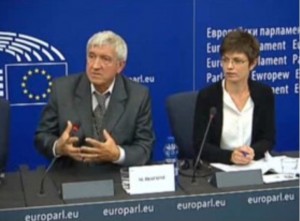
Mircea Diaconu, CULT rapporteur, speaking about the Report/EP Resolution ‘Towards an integrated approach to cultural heritage for Europe’ at a press conference held at the European Parliament on 8 September 2015. Photo: EP
On 8 September in Brussels, Members of the European Parliament recognised the vital role of heritage in Europe and the opportunities it represents for Europe’s economy and development by adopting with a large majority (613 votes in favour, 70 against and 19 abstentions) a Resolution calling for the implementation of an integrated approach towards cultural heritage for Europe. During the debate preceding the vote, the Rapporteur from Romania, Mircea Diaconu, described his report as a tool “to convince the political authorities of the importance of cultural heritage”. The Chair of the Education and Cultural Committee, Silvia Costa, also mentioned the relevance of communicating the importance of heritage to the European Commission to ensure the continuity of efforts in this field. For his part, European Commissioner Tibor Navracsics clearly stated the European Commission shares the view that “supporting, enhancing and promoting cultural heritage through an integrated approach is of paramount importance”.
This major policy development has occurred only several months after the Cultural Heritage Counts for Europe consortium published its final report for tapping into heritage’s full potential with compelling evidence of the value of cultural heritage and its impact on Europe’s economy, culture, society and the environment.
The past year has seen a momentum of political support for European heritage. The European Parliament’s resolution adoption on 8 September demonstrates renewed European commitment towards cultural heritage following the Conclusions of the Greek and Italian Presidencies (adopted in May 2014 and November 2014) and the Communication of the European Commission published in July 2014.
“We are particularly thankful to the European Parliament for sending such a strong message to the European Commission and the Member States that cultural heritage counts for Europe in a variety of ways. We wholeheartedly support the policy recommendations put forward in the Resolution, starting with the call to designate 2018 as the European Year of Cultural Heritage,” stated Secretary General Sneska Quaedvlieg-Mihailovic from Europa Nostra, the CHCFE project leader.
Policy Recommendations included in the Resolution
Apart from the European Year of Cultural Heritage 2018, the Members of the European parliament make a series of important policy recommendations. The Resolution is composed of 5 parts:
- The first on the Integrated Approach which “Considers it of paramount importance to use the available resources for supporting, enhancing and promoting cultural heritage on the basis of an integrated approach, while taking into account the cultural, economic, social, historical, educational, environmental and scientific components” and in which the Members call for the designation of 2018 as the European Year of Cultural Heritage;
- In the second part on European funding for cultural heritage, the Members ask the European Commission to dedicate a single EU portal to tangible and intangible cultural heritage regrouping all relevant information; to review the EUR 5 million benchmark for cultural heritage projects submitted in the framework of small-scale infrastructure action, aligning it to UNESCO projects (i.e. EUR 10 million); to include a compulsory quality control system throughout projects’ life-cycle in the guidelines governing the next generation of structural finds for cultural heritage;
- The third part on New Governance models, asks, amongst others, for the introduction of a heritage impact assessment to European legislative proposals;
- In the fourth part on The economic and strategic potential of cultural heritage, the Members affirm the urgent need to give cultural heritage its clear place in the Commission’s Investment Plan for Europe. They also ask the European Commission to propose a set of indicators to develop heritage statistics to be used to monitor and evaluate the state of heritage in Europe and the Member States to emphasise the value of their heritage assets by promoting studies to determine the cultural and economic value of the cultural heritage so as to transform the ‘cost’ of its preservation into an ‘investment’ in its value;
- The fifth part on Opportunities and challenges calls for a strong commitment on all sides to prevent, protect, document and restore cultural heritage and for the adoption of international agreements to prevent illicit trafficking of cultural heritage
Download the EP resolution “Towards an integrated approach to cultural heritage for Europe” here.
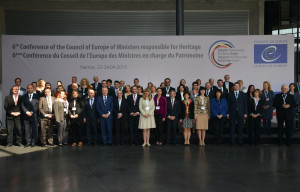 On 24 April European ministers responsible for cultural heritage have adopted guidelines for a European heritage strategy at their 6th conference entitled “Cultural heritage in the 21st century for living better together. Towards a common strategy for Europe.” Held from 23-24 April in Namur, the conference was organised in the framework of the Belgian Chairmanship of the Committee of Ministers of the Council of Europe.
On 24 April European ministers responsible for cultural heritage have adopted guidelines for a European heritage strategy at their 6th conference entitled “Cultural heritage in the 21st century for living better together. Towards a common strategy for Europe.” Held from 23-24 April in Namur, the conference was organised in the framework of the Belgian Chairmanship of the Committee of Ministers of the Council of Europe.
The purpose of the event was to define the conditions for elaborating a strategy for heritage in Europe 21st century, to protect and foster cultural heritage, promote good governance and participation in heritage identification and management, and meet the challenges facing heritage in the matters of citizen participation and in economic, social and environmental contexts. Furthermore, the conference was held to contribute to the development of a society based on the fundamental values of the Council of Europe, promoting mutual respect and recognition of diversity and taking into account the quality of life of its citizens as an expression of human rights.
The Conference gathered Ministers of the States party to the European Cultural Convention, the States of holding observer status with the Council of Europe or the Steering Committee for Culture, Heritage and Landscape (CDCPP), the Congress of Local and Regional Authorities, and representatives from the European Commission, UNESCO, and civil society. Members of the Cultural Heritage Counts for Europe were among the invited speakers, each representing their institution: Sneška Quaedvlieg-Mihailović, Secretary General of Europa Nostra; Brian Smith, Secretary General of Heritage Europe; and Prof. Claire Giraud-Labalte, Chair of the ENCATC Thematic Area Understanding Heritage and ENCATC Ambassador.
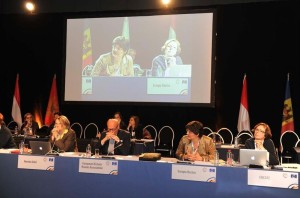 In her address to the Ministers, speaking also on behalf of other members of the European Heritage Alliance 3.3. Sneška Quaedvlieg-Mihailović emphasised the importance of a stronger cooperation and policy coordination between the Council of Europe and the European Union with regards to cultural heritage. She also thanked the Belgian Chairmanship for including the civil society so prominently in the preparations of the Conference and also in the deliberations during the Conference, allowing for a real open and constructive dialogue between the civil society and policy-makers.
In her address to the Ministers, speaking also on behalf of other members of the European Heritage Alliance 3.3. Sneška Quaedvlieg-Mihailović emphasised the importance of a stronger cooperation and policy coordination between the Council of Europe and the European Union with regards to cultural heritage. She also thanked the Belgian Chairmanship for including the civil society so prominently in the preparations of the Conference and also in the deliberations during the Conference, allowing for a real open and constructive dialogue between the civil society and policy-makers.
As a cultural heritage expert, Claire Giraud-Labalte was also invited to participate in conference’s preparatory meetings. Addressing the conference participants on 23 April, Claire Giraud-Labalte stressed for the need for education and training in heritage management and for and collaborative methods to address challenges faced in the sector. “Training is a key factor for the implementation of this European heritage strategy on condition of rethinking in a changing Europe. Training, initial and throughout life, must give way to a better knowledge of Europe in all its dimensions, fostering intercultural dialogue respectful of diversity and citizen participation in projects with creative methods and done in a collaborative way. This means to promote all approaches (intellectual, cognitive, sensory, experimental, etc.) in European heritage so that users derive pleasure and pride. By being more aware of its value, citizens adhere better to the efforts made in its favour,” said Prof. Giraud-Labalte.
In their closing session, the Ministers adopted the Namur Declaration, which defines the objectives and priorities for a future common European Heritage Strategy which they strive to adopt by the end of 2016. The Ministers call for this Strategy to be developed in close cooperation with the European Union, UNESCO and other international stakeholders and to offer a vision and 10-year framework for actions and to promote a shared and unifying approach to heritage management. They also want four priorities to be given due attention: the contribution of heritage to quality of life and living environment, its contribution to Europe’s attractiveness and prosperity, education and lifelong learning, and participatory governance in the heritage field.
In addition to the Declaration, the Ministers also adopted the Namur Call condemning deliberate acts of heritage destruction and advocating the need to reinforce European cooperation to prevent both the destruction of heritage as well as the illicit trafficking of cultural property.
At the end of the Conference, Europa Nostra congratulated Minister Maxime Prévot (Vice-President of the Walloon Government who is also Minister for Public Works, Health, Social Affairs and Heritage as well as Mayor of Namur) who acted as the highly committed and most inspiring Host and Chair of the entire Conference, and invited him to attend the Cultural Heritage Counts for Europe concluding conference to be held on 12 June 2015 Oslo.
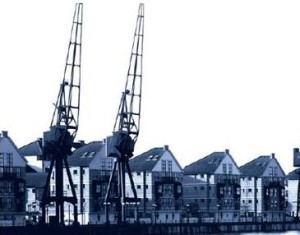 The report of the Horizon 2020 expert group on cultural heritage is now available online. The ‘Getting cultural heritage to work’ report is an important development for the heritage sector and further stresses the need for evidence and where cultural heritage has been a positive driver for sustainable development.
The report of the Horizon 2020 expert group on cultural heritage is now available online. The ‘Getting cultural heritage to work’ report is an important development for the heritage sector and further stresses the need for evidence and where cultural heritage has been a positive driver for sustainable development.
Under the chairmanship of Dr Philippe Busquin, former Commissioner for Research, Science and Technology and former Member of the European Parliament, the group of experts found that “Cultural heritage is a significant force for 21st century Europe. Not only is it at the heart of what it means to be European, it is being discovered by both governments and citizens as a means of improving economic performance, people’s lives and living environments… Evidence demonstrates that relatively modest investment in cultural heritage can pay substantial dividends. These can be taken economically but also in terms of improving environmental sustainability and social cohesion.”
The ‘Getting cultural heritage to work for Europe’ report, presenting the conclusions of the Expert Group established under the Horizon 2020 Work Programme 2014 for the Societal Challenge ‘Climate action, environment, resource efficiency and raw materials’, provides the rationale for setting a renewed European Research & Innovation policy agenda on cultural heritage. It outlines the general framework about cultural heritage in Europe and the contribution it can make towards smarter, more inclusive and more sustainable development.
The group of experts was composed of nine renowned experts from the private and public sector, including Brian Smith, Secretary General of the European Association of Historic Towns and Regions, who is also a Member of the Cultural Heritage Count for Europe Steering Committee.
The European Parliament’s Committee on Culture and Education held a public hearing on “An integrated approach to cultural heritage in Europe: State of play and perspectives” which took place on 2 December 2014 in Brussels. The hearing focused on the current state of play, the challenges faced and the steps to be taken in order to tap into the potential of cultural heritage for social progress and sustainable economic development.
The thematic presentations made by experts set the stage for the discussion with the members of the Committee on Culture and Education. Bénédicte Selfslagh, Deputy Chair of Belgium Committee ICOMOS, spoke about the challenges and opportunities for cultural heritage and the role of Member States, European institutions and international organisations. Aled Gruffyd Jones, Librarian of the National Library of Wales, explored the topic of documentary heritage. Jacek Purchla, Director of the International Cultural Centre in Krakow and partner of the Cultural Heritage Counts for Europe project, highlighted the role of cities and the value of the historic urban landscape. Sergiu Nistor, Professor at the University of Architecture and Urbanism of Bucharest, addressed the need for new models of participatory governance.
“It would be great if our cultural heritage experts could also be listened to by Ministers of Finance, or even Prime-Ministers, then maybe the overall result would be much more effective. It is very important to make sure that such voices are also heard in circles not related to culture and which often disregard culture,” advocated Bogdan Andrzej Zdrojewski, an MEP from Poland.
This position was endorsed by other MEPs and participants in the meeting. Several parliamentarians expressed their support for the proposal of organising a European Year of Cultural Heritage, which was made by the EU Council to the European Commission in their Conclusions on participatory governance of cultural heritage adopted on 25 November 2014.
Catherine Magnant, Deputy Head of Unit in the DG EAC of the European Commission, congratulated the EU Council on the adoption of the Conclusions on participatory governance for cultural heritage. “The Commission is committed to encouraging the Member States to engage in the coordination for its implementation,” she stated.
“Cultural heritage has a significant social and economic value, which is not easy to quantify. We all need to make some progress on that front. We look forward to learning about the final results of the European project Cultural Heritage Counts for Europe, which is financed by the Culture programme and led by Europa Nostra. It already has some concrete findings, particularly in the area of cultural tourism,” added the Deputy Head of Unit in the DG EAC of the European Commission.
At its meeting in Brussels on 25 November 2014, the Council of the European Union, under the leadership of the Italian Presidency, adopted Conclusions on participatory governance of cultural heritage, inviting Member States to promote a more active involvement of civil society and of the private sector in the governance of cultural heritage, at local, regional, national and European levels. On this occasion, cultural heritage was also set as one of the priorities of the new Work Plan for Culture for 2015-2018.
“Culture and tourism should constitute priorities for Europe and investment in these sectors is strategic for growth and development. The presidency’s view was shared by all ministers at our informal meeting in Turin, and today’s Council paved the way to giving culture and tourism a central role in EU policy-making,” declared the President of the Council, Minister Franceschini.
The Conclusions on participatory governance of cultural heritage highlight that the involvement of all interested parties in decision-making, planning, implementing, monitoring and evaluating cultural heritage policies and programmes can increase public awareness of the values that it represents, reinforce transparency and accountability in the use of public resources, and build trust between citizens and public authorities. Alongside tangible and intangible heritage, the Conclusions underline that digital heritage can be used for the development of innovative services, such as Europeana. They also explore synergies between the culture and tourism sectors. The Conclusions also include an invitation to the European Commission to propose a “European Year of Cultural Heritage”.
At the same meeting, the EU Council also adopted Conclusions establishing a Work Plan for Culture (2015-2018), which sets four priority areas: accessible culture, cultural heritage, creative economy and innovation, and cultural diversity. These are complemented by two cross-sectorial themes: digital shift and statistics. The plan is a strategic document setting out the priorities for European cooperation in cultural policy-making for the next four years, focusing on topics that represent a clear EU added value and encourage cross-sectorial cooperation.
Furthermore, ministers debated on the contribution of cultural and creative sectors, including cultural heritage, to the Europe 2020 objectives, in the context of the mid-term review of the strategy. It was stressed that culture represents around 4% of EU PIB and contributes to growth through innovation, the digital economy, employment and youth policy, industrial policy and resource efficiency and is in turn affected by decisions in other policy areas. Most ministers emphasized that the EU’s cultural and creative sectors give Europe a competitive advantage over the rest of the world since they benefit from something that is unique to Europe: an extraordinarily rich and diverse cultural heritage.
Less than two months after the adoption of the far-reaching EU Council Conclusions on cultural heritage as a strategic resource for a sustainable Europe, the European Commission has adopted on 22 July its Communication which paves the way for an integrated approach to cultural heritage in Europe.
This important policy document aims to help Member States and stakeholders to make the most of the significant support for heritage available under EU instruments and also calls for stronger cooperation at EU level to share ideas and best practices, which can feed into national heritage policies and governance. It highlights the opportunities for Member States and stakeholders to work more closely across borders to address the many challenges facing the heritage sector, and also to ensure that cultural heritage makes an even stronger contribution to a sustainable Europe.
The Communication also states that “To increase understanding of the actual and potential role of heritage in policy development, it is important to improve systematic data on its economic and social impacts,” and goes on to provide the Cultural Heritage Counts for Europe project as one important example in the way forward.
The European Commission has also released an accompanying “Mapping Report” which provides a comprehensive overview of EU policies, legislation, programmes and funding opportunities relevant to cultural heritage.
The Cultural Heritage Counts for Europe project consortium congratulates Mrs Androulla Vassiliou, European Commissioner for Education, Culture, Multilingualism and Youth, and the DG Education and Culture, for this new crucial step forward in developing a comprehensive EU strategy for the protection and enhancement of Europe’s shared cultural heritage.
LINKS:
Mapping of Cultural Heritage actions in European Union policies, programmes and activities
For the first time ever, the Council of the European Union has adopted Conclusions on cultural heritage as a strategic resource for a sustainable Europe.
Under the leadership of the Hellenic Presidency of the European Union, the Education, Youth, Culture and Sport Council adopted these historic conclusions at its meeting on 21 May in Brussels.
These conclusions adopt a holistic policy approach by the EU to cultural heritage – tangible, intangible or digital – recognising it as a unique resource and a major asset for Europe and for the entire European project. The conclusions emphasize the important role that cultural heritage plays in creating and enhancing social capital, as well as its important economic impact and its specific role in achieving the Europe 2020 strategy goals for a smart, sustainable and inclusive growth because of its social and economic impact and its key contribution to environmental sustainability.
The conclusions call for more resources to be invested in cultural heritage and for the mainstreaming of cultural heritage in national and European policies. Member States are invited to consider including cultural heritage in the framework of the next Council Work Plan for Culture which will be implemented from 2015 onwards.
The European Commission is also invited to further support at EU level the networking of, and pooling of resources between, public and private sector heritage experts and practitioners as well as civil society organisations.
The Cultural Heritage Counts for Europe wishes to congratulate the Hellenic Presidency of the EU, and especially the Hellenic Ministry of Culture and Sports, for this major step forward in developing a comprehensive EU strategy for the protection and promotion of our shared cultural heritage, as a strategic resource for a sustainble Europe.
Read the EU Council Conclusions here.
